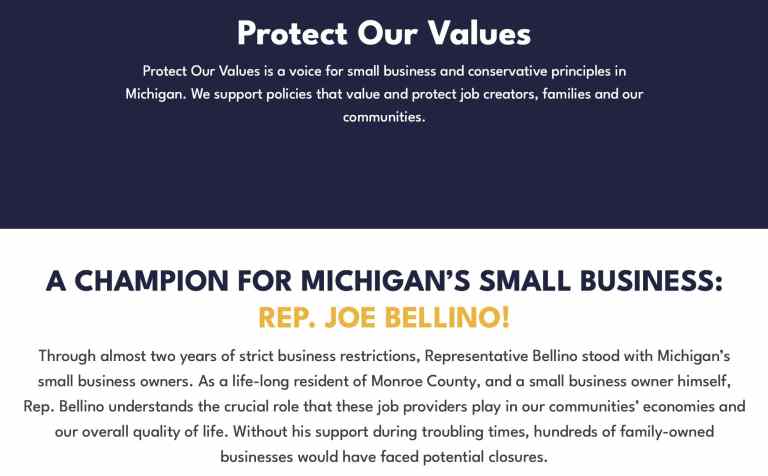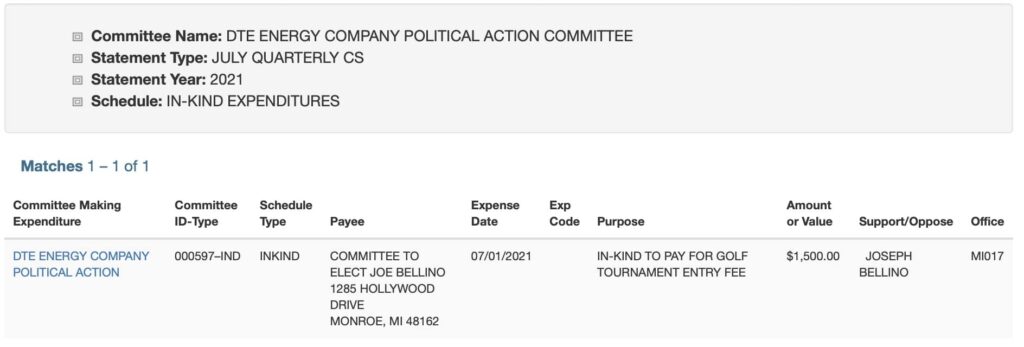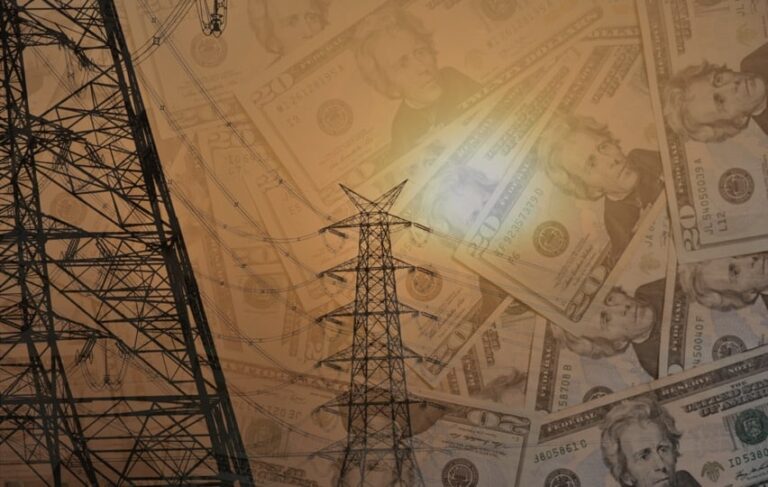New Michigan front group with connections to DTE Energy launches ahead of the elections

Protect Our Values, a new dark money front group with connections to DTE Energy appears to be preparing to send messages to voters this election season. Protect Our Values was registered in May as a new entity associated with a 501(c)(4) organization called Michigan Energy First, which is led by a DTE vice president and lobbyist. The new entity is supporting Republican State Representative Joe Bellino, who is chair of the House Energy Committee. Bellino has helped the utilities while frustrating clean energy advocates in recent years with his refusal to allow his committee to vote on legislation that would lift the cap on distributed generation programs.
On May 2, Michigan Energy First received a Certificate of Assumed Name for the new front group called Protect Our Values. The website domain for Protect Our Values was also registered on May 2. Several images of Bellino are featured on the website along with a call to action for people to fill out a form to “send him a message that you appreciate what he has done to protect small businesses in Southern Michigan!”
Bellino has served as the chair of the House Energy Committee for two consecutive terms (2019-2020; 2021-2022). He is currently running for State Senate District 16 and faces Representative TC Clements in the Republican Primary on August 2.

Michigan Energy First’s president is DTE Energy’s Vice President of Corporate and Government Affairs Renze Hoeksema, and the group’s treasurer is Theresa Uzenski, a manager of regulatory accounting at DTE Energy.
The Hoeksema-led entity appears to have served as a central hub connecting several other associated front groups beyond Protect Our Values, including Alliance For Michigan Power, Michigan Energy Promise, and the Clean and Sustainable Energy Fund (CASE). The Los Angeles Times recently reported on how CASE received $3 million from Michigan Energy First, some of which it passed along to the foundation for a DOE national laboratory who then advocated for California policymakers to advance carbon capture and sequestration (CCS) as part of the state’s emission reduction plans. DTE owns several biomass plants in California and has plans to use CCS in the state, over the objections of some environmental justice groups. Hoeksema would not answer reporter Sammy Roth’s questions about the origins of the CASE money, and DTE said it “cannot speak for CASE or Michigan Energy First.”
DTE does not disclose its 501(c)(4) contributions and has urged shareholders for years to reject investor board resolutions that call for transparency. As a 501(c)(4) organization, Michigan Energy First does not have to disclose the origin of its contributions. But the beneficiaries of its political operations are clear based on publicly available information. For instance, money that flows through Michigan Energy First has gone to the Michigan Democrats State Committee and Michigan Republican Party, as well as several conservative 501(c)(4) organizations such as the Michigan Freedom Fund, Michigan Conservative Values, and Conservative Leadership & Values Coalition.
Rep. Bellino helped DTE fight off competitors
In early 2021, legislation (HB 4236) was introduced to lift the cap on utility distributed generation programs in Michigan. The state’s current cap is set at 1 percent of a utility’s in-state peak load. At a hearing on the bill, Michigan Public Service Commission Chairman Dan Scripps testified that “there is no engineering need for a system wide cap.”
Bellino refused to allow the committee to vote on the bill.
Months later, Gongwer News Service revealed that DTE Energy paid a $1,500 in-kind contribution for Bellino to play in the Delta Dental Pro-Am at the Rocket Mortgage Classic – a PGA golf tournament held at the Detroit Golf Club. A pro-am allows guests to play with professional golfers on the PGA tour along with other athletes and celebrities a day before the start of the official tournament.

After the revelation of the in-kind contribution, Michigan League of Conservation Voters launched a campaign in Bellino’s district that called for a vote on HB 4236 while highlighting the cozy relationship their representative has with the utilities. Bob Allison, deputy director for the Michigan League of Conservation Voters, said at the launch of the campaign, “This ridiculous, unnecessary cap on rooftop solar — the only of its kind in the country — must go, but Mr. Bellino continues to delay and obstruct on behalf of DTE and Consumers while Michiganders suffer through prolonged blackouts and days without power while paying the highest rates in the Midwest. We need our lawmakers to stand up for us.”
Another entity associated with Michigan Energy First, Alliance For Michigan Power, launched a social media campaign after the hearing of HB4236 that targeted five Democratic representatives – Reps. John Cherry, Jim Haadsma, Donna Lasinski, Mari Manoogian, and Ranjeev Puri. All of the representatives are on the energy committee other than Lasinski, who is the House Democratic Leader. The advertisements criticized “out-of-state” solar developers and claimed that HB 4236 would raise the cost of electricity for everyone and undermine the state’s clean energy goals. Another front group called Citizens for Energizing Michigan’s Economy, which has received over $43 million from Consumers Energy, Michigan’s other large investor-owned utility, ran a simultaneous advertising campaign that claimed “out-of-state special interests” caused the February 2021 blackouts on the Texas electrical grid in February. Utility companies in Texas – specifically Calpine, Vistra, and NRG Energy – all have said gas shortages affected their ability to operate their power plants, and all independent assessments of the blackouts found the same thing.
History of Michigan utilities operating through front groups to influence state elections
Protect Our Values’ apparent operation to keep Bellino in the Michigan legislature will not be the first attempt by utility front groups to influence the state’s primary and general elections. In 2018, then-Representative Gary Glenn ran against Kevin Daley for Michigan Senate District 31. Voters were targeted with advertisements that criticized Glenn and compared him to a snake. Glenn was chair of the House Energy Committee at the time and had sponsored an “Energy Freedom” package which would have allowed people to generate renewable energy more freely and be reimbursed more generously, along with other policy changes that went against the utility’s interests.
Glenn lost his election and blamed the defeat on DTE Energy and Consumers Energy. After the primary, Glenn told Midwest Energy News, “I raised two-and-a-half times more money than Kevin Daley did. Absent the $1 million-plus in independent spending from DTE and Consumers, I’m confident I would have beat Daley by double digits. They spent three times more than Daley and I put together. I don’t think there’s any question they were responsible for what would have otherwise been an easy victory.”
In 2020, Consumers Energy’s Citizens for Energizing Michigan’s Economy launched political advertising campaigns to support Republican candidates John Damoose, Andrew Beeler, Pat Outman and Andrew Fink, and Democratic candidate Ranjeev Puri – all of whom were running in their first elections and won.



